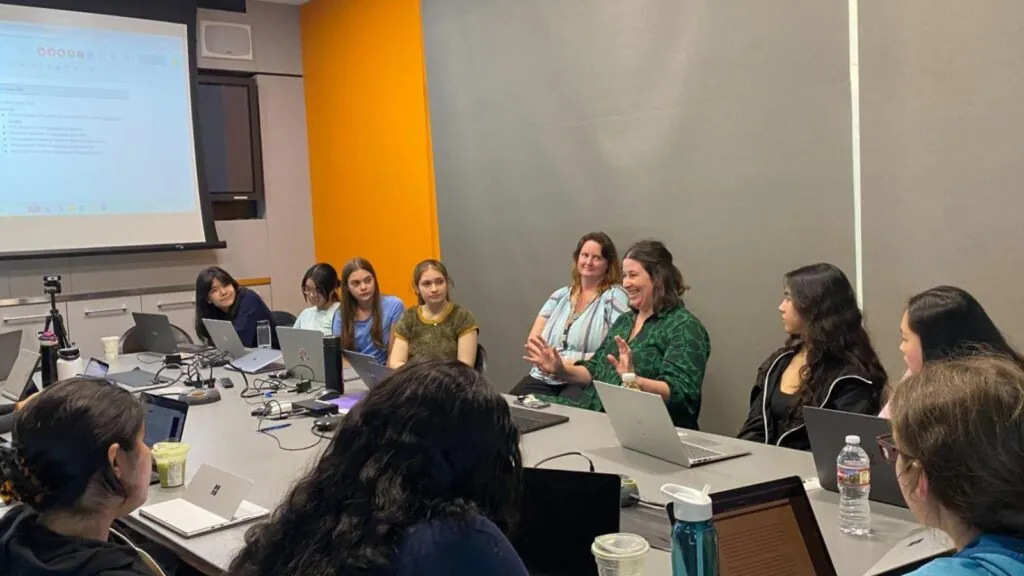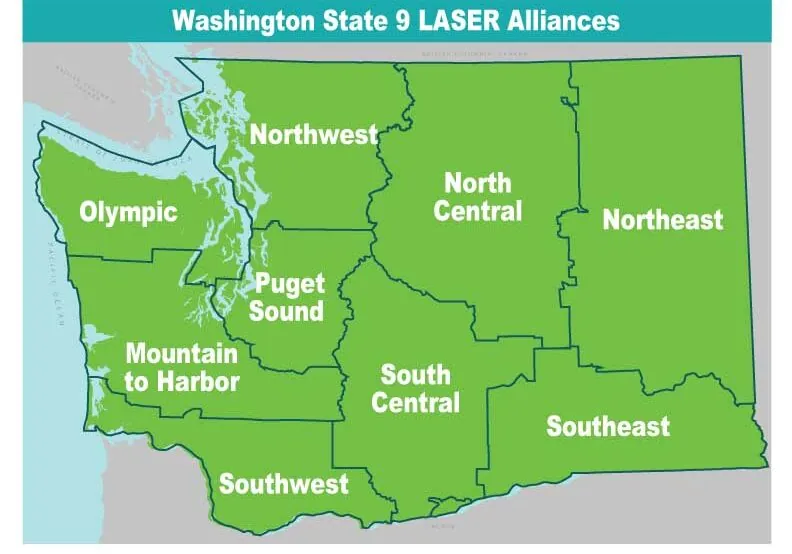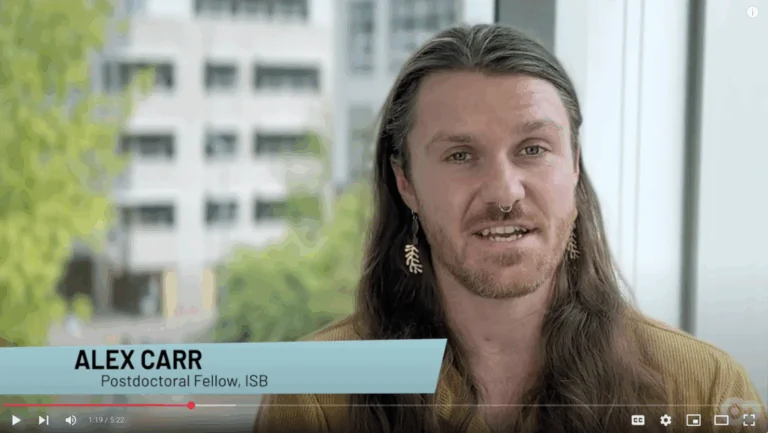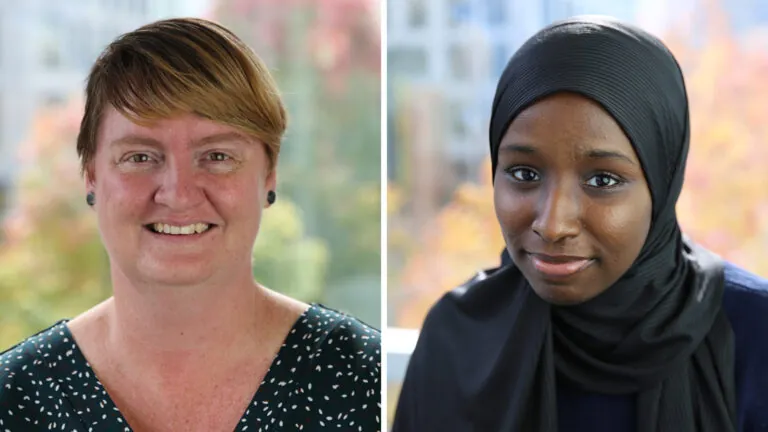2024-25 School Year ISB Education Highlights
This summer at ISB, 12 college interns dove into research and a science-themed book club, while five education programs engaged 150+ high school students in hands-on learning, data science, systems thinking, and leadership – thanks to generous partners and supporters.

SUMMER ROUNDUP
Students at ISB: Science in the Lab and Beyond
Twelve undergraduate/graduate student interns spent the summer at ISB, immersing themselves in what it means to be a scientist – conducting research, collaborating with mentors, and developing their skills.
This year, they also tried something new: a science-themed book club from ISB’s Inquisitive Scientists’ Bookshelf. Each intern selected a book recommended by ISB staff, read it over the summer, and shared key takeaways during one of their regular group meetings. The discussions sparked thoughtful conversations about the many ways science connects with society, giving interns a chance to reflect on the broader impact of their work and their future roles as scientists.
Some of the books: Brave Genius, Braiding Sweetgrass, It’s Not Too Late, and The Maniac.

Summer Programs
ISB was on overdrive, offering five summer programs for over 150 high school students.
These programs were made possible thanks to the Jones Family Foundation, EmbiTec, ISB Education’s philanthropic donors, WA Network for Innovative Careers, and NIH National Cancer Institute grants to Columbia University and ISB.
Summer program details:
- High School Interns participated in systems biology research projects over eight weeks across three lab groups. You can view their final presentations here.
- In partnership with Columbia University, DREAM High Students learned to visualize and analyze cancer data in the cloud over six weeks.
- In partnership with Washington Network for Innovative Careers, 40 high school students earned credit for completing hands-on learning at Lake Washington Institute of Technology through our 90-hour course, Biosystems, Genetic Research and Ethics.
- Systems Thinkers in STEM Ambassadors completed microcourses and applied their learning by creating and launching community action projects.
- Students from these programs joined together to develop foundational leadership competencies in LEADS.
MAY/JUNE
2024/25 School Year Wrap Up
A month ago, ISB Education was faced with sudden and deep funding cuts from Washington state, which will end two of our core projects: ClimeTime and LASER. We also received notice to immediately pause the service terms of our two AmeriCorps members.
This month, we are focused on finishing strong with the teacher and principal programs still running for a few weeks. We are excitedly gearing up for summer programs for students (college and high school internships, courses, ambassadors) despite running these at a reduced level.
Over the summer, we will strategize how best to pivot, innovate, and seek bridge funding. For now, we are pleased to share impactful quotes from our 2024/25 program participants!
Students have been learning in our internships, ambassadorships, and courses this year
High school ISB Student Interns reflected on the most important thing they learned about themselves during this experience:
“I realized that when given the responsibility of completing a STEM project, I’m able to step up to the challenge. Sharing this with other people allowed me to view myself as a scientist through their perspectives.”
High school Systems Thinkers in STEM Ambassadors reflected on their learning:
“I loved the different opportunities we had to work with others throughout the LEADS sessions, such as discussing complex issues in breakout rooms. I was a bit nervous at first to meet others, but I’m so glad we had the opportunity to do so. I grew more comfortable sharing my ideas in small groups and also voicing my ideas to the larger LEADS group over the course of the sessions.”
High school students participating in an ISB course reflected on their learning:
“Running an experiment where bacteria growth is measured over a period of time is no easy task. You can run into a lot of problems like we did, where one of our bacteria samples spilled. However, the way we continued our research without this sample, helped me realize my passion for STEM.”
Learn more at https://see.isbscience.org/resources/for-students/
Teachers have been learning in ISB Education’s new online ClimeTime workshops
Teachers reflected on their professional learning:
“I learned that with the right tools and information, I can facilitate students using exploration and strategies to deepen their understanding. I was also able to step aside and allow them to lead the learning, and I saw how they were excited to share their learning at the end of the lesson.”
Teachers reflected on what they learned about their students:
“I learned that my students, even as kindergarteners, can grasp the concept of systems. They were able to apply this knowledge and find systems in everyday life!”
Teachers reflected on what they learned about themselves:
“I learned that I don’t need to take on the work of creating lessons or activities on my own. There are so many great resources out there about teaching systems and I found so many useful resources by taking this course.”
Teachers identified classroom successes:
“Students were highly successful in applying their learning of a system to making a terrarium for the worms. They made sure to include all the parts (water source, food source, soil, etc…) to make the habitat a safe place for the worms to be. We even discussed how the terrarium system was reliant on humans to keep it going, but in the natural world the worms wouldn’t need us to provide food/water sources.”
Learn more at https://www.climetime.org/
Principals have been learning in an ISB Education series called ‘Principles of Science for Principals’
Principals of elementary schools in southwest Washington, doing Learning Walks through grade K-5 classrooms observed:
“Students talking to one another really expanded thoughts and promoted improved outcomes.”
“There is not enough time to make [sure] science and integrated / immersed / interdisciplinary integration [is] happening! We definitely need to make this a priority in both of my schools.”
“I learned that when the teacher works as the facilitator versus just giving [students] answers to the questions they play a great role in giving the power to the students to learn through trials and investigations.”
Learn more at https://logancenter.isbscience.org/our-work/
APRIL
Teachers are learning via new ISB courses online – March-June, ongoing
The Education team transformed three of our popular workshops for educators into a new format: the “Canvas” online learning platform. We are excited about how this new format enables many more teachers to participate in our workshops and overcomes teachers’ time constraints. Teachers in the courses learn at their own pace, plus the ISB team holds several well-timed, live sessions for all to meet on Zoom. These sessions allow the individuals taking the course to gather, meet colleagues all across Washington state, and share ideas for trying out their new learning in their science classes with students.
Learn more at https://www.climetime.org/
Leadership teams at the LASER Spring Gathering – April 14-15 at Bellevue Botanical Garden
Forty-five educators across Washington participated in this in-person two-day workshop called “Connecting High Quality Instructional Materials (HQIM) and High Quality Professional Learning (HQPL).” The workshop was designed specifically for science education leaders, to attend with a team from their school system.
Learn more at https://www.wastatelaser.org/.
ISB presented at the WA Climate Summit – April 25-26 at WSU-Vancouver
Two hundred teachers participated in this in-person two-day workshop on Climate Education, held in Vancouver, Wash. ISB Education Cconsultant Barb Steffens and AmeriCorps Member Sarah Clemente presented a workshop on the SEE modules for teachers to explore those resources first hand. They also set up a display table with info about upcoming ISB Education workshops.
Learn more at https://www.climetime.org/
MARCH

ISB educators have been busy joining other STEM enthusiasts in the local community.
- On March 8 at Mountlake Terrace High School, Sarah Clemente volunteered for the annual Central Sound Regional Science & Engineering Fair (CSRSEF). She reviewed seven out of 25 entries in the Earth and Environmental Science categories for high school students in the western region of Washington state.
- On March 15, ISB participated in BrainFest 2025 at the Pacific Science Center with an activity called “Blood-Brain Barrier Breakout.” The highly interactive and visual activity was created by a collaborative group led by Jacob Cavon in the Gibbons Lab. Other ISB partners included Claudia Ludwig and Jan Chalupny, as well as Sydney Floryanzia, Nada Naser, and Monica Tschang from UW, and Claire Weichselbaum and Troy Mead from the Allen Institute. More than 3,400 people attended BrainFest.
- On March 22, Claudia Ludwig joined Ilinca Hamza, a 2024 ISB high school intern, as a guest speaker through Girls Rock in Science and Math. This energetic group of over 30, 3rd-5th graders asked many questions and excitedly shared their plans for staying in STEM.
Learn more about ISB Education’s community events at https://see.isbscience.org/about/history/see-timeline/.
ISB hosted ‘Science Pathways for All’
The Puget Sound LASER Alliance held its 2nd annual symposium at ISB. This year’s event is in two parts, March 13 and May 1. Participants were from big school systems across the greater Seattle Metro area: Bellevue, Clover Park, Everett, Lake Washington, Puyallup, Renton, Tacoma, and the ReLife program.
We give a heartfelt thank you to Connor Kelly, Ethan Brown, Dr. Jim Heath, Dr. Jake Valenzuela, and Dr. Sean Gibbons – an incredible set of SB researchers and staff gathered by Dr. Jen Eklund to join the event for an engaging discussion of science pathways.
Applying systems thinking to make strategic changes to the K-12 science programs, this series is led by John Leitzinger and Caroline Kiehle (ISB), Dr. Anastasia Sanchez and Dr. Kevin Ikeda (Puget Sound Educational Service District), and Kirk Robbins (Robbins Consulting Services). Learn more at https://www.wastatelaser.org/.
‘What We Can’t Stop Thinking About!’
The Education team collaboratively built a few slides to display our current progress for the March ClimeTime workshop. We made a collage of our top four wonderings and called it “What We Can’t Stop Thinking About!”:
How can we reach ClimeTime’s original vision of having every student in Washington have meaningful climate science education every year?
How can we inspire students to take action, on a big scale in classrooms across the state?
How can we engage more districts?
How can we continue to deepen teachers’ professional learning? (With the subquestion: How are you a systems thinker? With quotes from teachers reflecting on their learning.)
Learn more at https://www.climetime.org/
FEBRUARY
Burien Teen Services Fair
Two of our SEE team members serving WSC at ISB, Faduma Hussien and Sarah Clemente, led a session at the Burien Library for their Teen Services’ First Internship and Opportunity Fair for teens and young adults. Faduma and Sarah met with many high school students and young adults looking for STEM-related experiences.

Our focus was on various programs students could interact with on our website, such as Gaining Insight, LEADS, Systems Thinkers in STEM interview series, and the upcoming 8-week Internship and Systems Thinkers in STEM Ambassadorship, all offered by Systems Education Experiences this summer.
WSTA bite-size workshop
Held after school every few weeks, the Washington Science Teaching Association (WSTA) offers a bite-size workshop series for teachers on a wide range of topics. This month, ISB was invited. Caroline Kiehle and Claudia Ludwig presented two small bites for teachers to learn about ISB, exploring the systems thinking approaches used both in our scientific research and in our K-12 education work.
Bite 1 – What is ISB, the Institute for Systems Biology?
We took a virtual tour in a video made by young people in ISB summer programs.
Bite 2 – How does ISB support K-12 and post-secondary educators across Washington state?
We did the “What is a system?” activity together, and then explored our menu of upcoming workshops.
Learn more about WSTA.
Institute for Science Education Leaders
The Smithsonian Science Education Center hosted eight school systems – teams of educators/administrators/stakeholders – with an intensive week-long Institute in Washington, DC. District teams learned how to map out steps toward implementing change to their K-12 science programs, through the guided development of a strategic action plan. Six science education leaders from across the country, including ISB’s Caroline Kiehle, comprised the faculty and taught the key elements of the LASER model (Leadership Assistance for Science Education Reform), providing experience from their own state’s work.
Learn more https://ssec.si.edu/strategic-planning-institute
JANUARY
A rush of summer intern applicants
The ISB Education team is matching student applicants with ISB researchers for summer 2025.
So many students completed the preliminary application for our Summer Undergraduate Research Experience Program that they broke the system. Again! It’s been sorted now and over 200 students will be invited to complete the full application in February.
Also in February, ISBers will hold office hours and panel discussions to support students in completing high-quality applications and be prepared for the next step. In March, mentors will interview students and invite them to join us at ISB this summer.
Microbiomes in our communities and our community colleges
In January, as part of the Next-Gen Bio Learning Network, community college faculty met with Dr. Sue Ishaq to think about how a focus on microbiomes allows us to explore how a variety of factors, both natural and designed, influence communities across the world. The group thought about what students should know about the world of microbes and how they should be prepared to make sense of microbiomes.
Sparking students’ interest in science
Twenty principals, curriculum directors, and superintendents are learning together in a two-month series called Principles of Science for Principals. These school leaders are from Washington state’s southwest and south Puget Sound regions.
In January, ISB Associate Professor Dr. Sean Gibbons was our guest STEM professional. Sean’s session highlighted his own experience of being bitten by the science bug in first grade, and then he shared his pathway toward his current passion for applying his science research. We followed up with a deep discussion among the school leaders about the importance of engaging young students with science explorations and how math and literacy skills increase as a result.
Learn more about the P4P series.
DECEMBER
Teachers are gearing up for students’ lab investigations using SEE modules
This month ISB Education distributed lab kit materials to schools in Middletown, R.I., Andover, Mass., and Seattle. These kits will enable three teacher teams to guide their students in using Halobacterium – a colorful and safe model organism – to conduct systems-level microbiology experiments. These experiments are based on our Ecological Networks and Environmental Influence on Gene Networks modules.
Teachers are learners, too
Here are a couple of quotes from some of the teachers we worked with this fall:
“Students are engaged in learning in ways that are different from my generation of learning, but adaptation is important and sometimes they teach me more than I am teaching them. I learned that I need to be flexible and open to the ideas presented by the students. I learned to be more open-minded in viewing ‘what’ a system is and understanding that systems are changing from external and internal forces.”
“What did I learn about systems? I learned that the word ‘system’ is used frequently but isn’t always defined. I appreciated having to truly sit down and think about what a system is.
What did I learn about my students? I learned that my students have a better grasp on what a system is than what I thought they would.
What did I learn about myself? I learned that I had a hard time expressing what I thought a system was and it was very similar to how my students express how they see systems. Without explicit instruction, sometimes we forget exactly what something is.”
LASER is strengthening its network

The LASER Leadership Team now includes the two state science directors – Johanna Brown, Secondary Science; and Kimberly Astle, Elementary Science – who are working side-by-side with the three regional Alliance directors and the Advisory Group to guide the statewide network of science education leaders. We are applying systems thinking to evolve this network.
Washington State LASER – “Leadership and Assistance for Science Education Reform” – is a network supporting K-12 science education comprised of the Office of Superintendent of Public Instruction, all Educational Service Districts, and the Institute for Systems Biology. Learn more at https://www.wastatelaser.org/.
NOVEMBER

Ignite STEM! Thank you to all the friends of ISB Education
On November 13, ISB held the annual Ignite STEM event to celebrate our education program impacts. At the heart of this evening is the Valerie Logan Leadership in Science Education award. The two awardees for this 11th year are Dr. Phil Bell and Dr. Deb Morrison (pictured above), honored for their leadership in science ed to the College of Education and for their game-changing set of open-source STEM Teaching Tools.
We appreciate your help making Ignite STEM a success – we’ve raised over $50,000 to support programs with students and educators this year.
See a collection of photos from the event here, and watch this video of a moving recollection and tribute of a former ISB high school intern who is now a graduate student working toward her PhD at UC Berkeley.
Next-Gen Bio Learning Network – bringing ISB science to undergrad students
This month, the community college faculty dove deeper into their work for the year when they met with ISB faculty member Dr. Jennifer Hadlock. These biology faculty discussed a variety of topics with Jenn – a highlight was building a vision for course materials to support community college students to better understand how our personal health data is and isn’t protected.
The group will continue to partner with scientists throughout the year to continue to consider how the volume, velocity, and variety of biological data should be impacting our undergraduate learners.
LEADS completes its 5th cohort
Leadership Empowerment And Development in STEM (LEADS) 17 “Systems Thinkers in STEM” Ambassadors just completed their program as the 5th cohort of LEADS. This cohort was a hybrid model with four virtual sessions over Zoom and one in-person day onsite at ISB. The ambassadors truly enjoyed exploring STEM careers and various leadership roles and styles throughout the 12-hour program.
A HUGE thank you to the ISB speakers who joined us during this cohort, Monica Orellana, Samantha Peikos, Jake Valenzuela, Claudia Ludwig, Anna Kuchina and Alice Kane.
In total, 74 students have completed the LEADS program since its 2022 onset. To learn more about the LEADS program and various other Systems Education Experiences, check out our webpage here.
OCTOBER

Welcome aboard: We have expanded our team
Faduma Hussein recently joined ISB as a Public Health Ambassador Coordinator, and is the fourth AmeriCorps Member to work with our team. In this Q&A, Faduma shares what drew her to ISB, what she hopes to accomplish over the next year, and more. Faduma joins Sarah Clemente, who is now on her second AmeriCorps service term this year.
Ethan Brown returns to ISB to join our team as an Education Assistant thanks to a grant from the Dean Witter Foundation. Ethan was a 2018 high school intern who helped us launch our Systems Medicine education initiative. We are thrilled to have him return with his advanced skills to further expand the reach and impact of the Systems Medicine 180-hour course.
Puget Sound LASER Alliance is a science leadership network to support all the school systems in Pierce and King Counties. This partnership is growing to deepen our impacts; Kirk Robbins (science education consultant) and Drs. Anastasia Sanchez and Kevin Ikeda (Puget Sound Educational Service District) are now joining John Leitzinger and ISB Education to collaboratively lead this regional effort.
Our programs for the 2024/25 school year
We are innovating a new format for “Systems Are Everywhere!” – one of our popular ClimeTime workshops. The new format uses the Canvas platform, enabling teachers to learn online at their own pace over a four-week series. Teachers try out new strategies and concepts with their students in small steps throughout the series, with coaching from the ISB team and fellow participants.
Our partnership with Central Kitsap School District has entered its third year, and is off to a fast start. Five workshops in a 20-part series are completed, involving all the high school science teachers in the school system. Teachers collaboratively work on strategies targeted at enabling every student to do the “figuring out” of phenomena, so students can uncover and “discover” key science concepts.
Presenting our work: Washington Science Teachers Association conference
Three folks from our team – Barb Steffens, Jan Chalupny, and Claudia Ludwig – attended and presented at the annual Washington Science Teachers Association (WSTA) on October 12. This year brought us to Ridgeline High School in the Spokane Valley to work with educators across the state. The team presented and supported these three workshops that introduced teachers to new, hands-on, authentic science experiences designed for high school students:
- Microplastics in the Arctic: Mega Problem?
- A Hands-On Lab to Engage Students in Breast Cancer Research (presented in partnership with our collaborator EmbiTec)
- Fungus Among Us – Valley Fever Investigation (led by EmbiTec)
We also connected with other leaders in education including Fred Hutch’s Science Education Partnership and the state’s Office of Superintendent for Public Instruction.


